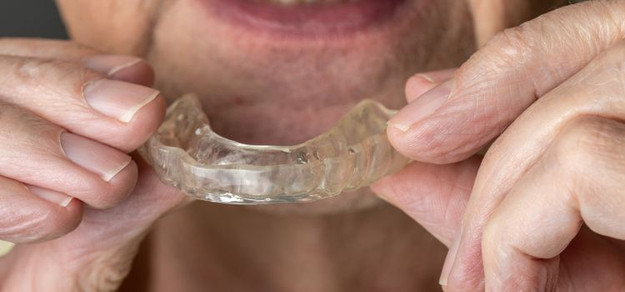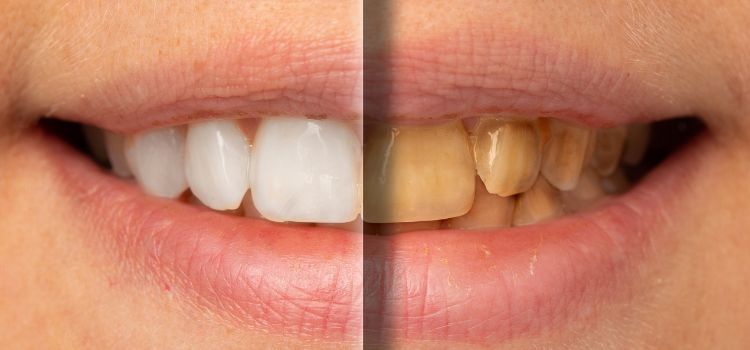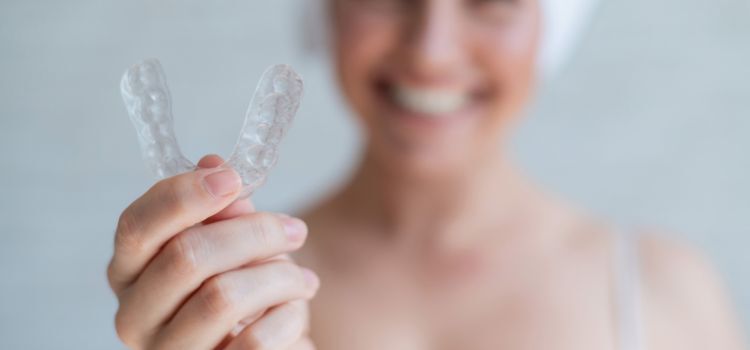Night Guard Staining Teeth
9th Aug 2025

Noticing stains on your night guard? You wear it to protect your teeth, but now it looks discolored—and you might be wondering if it could stain your teeth too.
The good news? Stained night guards are common and easy to fix.
In this guide, we’ll explain why night guards stain, how to clean them, and how to prevent it from happening again—so you can keep both your night guard and your smile fresh and clear.
Can a Stained Night Guard Discolor Your Teeth?

A stained night guard won’t directly stain your teeth, but it can increase the risk of discoloration and other oral health issues. Here’s how:
Bacteria and Plaque Transfer
If your night guard isn’t cleaned properly, bacteria and plaque can build up. When you wear it, those bacteria can transfer to your teeth, leading to stains, bad breath, and cavities.
According to Healthline, since mouthguards sit inside your mouth, bacteria from your saliva can build up on them—and without regular cleaning, that bacteria may multiply, increasing the risk of infection or odor.
Leftover Stains from Food & Drinks
Night guards can absorb dark pigments from drinks like coffee, tea, and wine. These pigments may linger on your teeth after use, contributing to discoloration.
Dry Mouth and Reduced Saliva Flow
Wearing a night guard may reduce saliva flow overnight, which can make it easier for plaque and stains to stick to your teeth.
Hard-to-Clean Stains
If the stains on your night guard are deep, they can harbor bacteria that may lead to yellowing or damage to your enamel over time.
Pro Tip: If you notice stains forming on your teeth after using a night guard, a consistent cleaning routine can help prevent buildup and protect your smile.
Related Articles:
Why Do Night Guards Stain?
Night guards can develop stains over time due to daily use and exposure to various substances. Here are the most common reasons:
Tobacco Use
Smoking or chewing tobacco can leave brown or yellow stains. Nicotine and tar cling to the material, making them hard to remove.
Food & Drink Residue
Dark drinks like coffee, tea, wine, and soda can stain your night guard—especially if you don’t rinse your mouth before putting it in.
Poor Cleaning Habits
Without proper daily cleaning, plaque and bacteria can build up, causing discoloration and odor.
Material Absorption
Some night guards are made from porous materials that absorb stains more easily, making them tougher to clean over time.
Exposure to Harsh Chemicals
Using bleach, alcohol, or abrasive toothpaste can damage the surface and lead to discoloration.
Saliva & Bacteria Buildup
Saliva naturally contains minerals and bacteria that can contribute to staining if the guard isn’t cleaned regularly.
Note: A night guard is a great way to protect your teeth from grinding or injury, but it needs proper care. According to Colgate, it’s important to clean your mouthguard and make sure it’s free from food debris and bacteria before each use.
How to Prevent Night Guard Staining

Keeping your night guard clean and stain-free is easy with a few daily and weekly habits. Follow these tips to prevent discoloration:
Clean Your Night Guard Daily
Rinse with lukewarm water and brush gently using a soft toothbrush and mild soap after each use. Avoid toothpaste—it can be too abrasive.
Avoid Stain-Causing Foods & Drinks Before Bed
Drinks like coffee, tea, wine, and dark sodas can stain your night guard. Be sure to brush and rinse your mouth before putting it in.
Use the Right Cleaning Products
Stick to gentle options like mild dish soap, hydrogen peroxide, or vinegar. Avoid bleach, alcohol, or abrasive cleaners, which can damage the material.
Store It Properly
Use a ventilated case to allow your night guard to dry completely. Avoid sealing it in a damp container, which can lead to bacteria growth and staining.
Do a Deep Clean Weekly
Soak your night guard in a vinegar and water mix or hydrogen peroxide for 15–30 minutes to tackle stubborn stains and bacteria buildup.
Replace When Necessary
If your night guard has permanent stains, smells bad, or begins to break down, it’s time for a replacement.
Related Articles:
- How To Remove Calcium Buildup On Night Guards
- Night Guard Turning Yellow
- Night Guard Has a Bad Taste? Here’s What To Do
How to Clean a Stained Night Guard
If your night guard is already stained, don't panic—you can remove discoloration with the right cleaning methods.
The American Dental Association emphasizes the importance of cleaning your mouthguard daily to remove food debris and bacteria. This helps prevent odor, plaque buildup, and oral infections.
Here are the best ways to clean your night guard safely:
Daily Cleaning Routine
- Rinse Immediately After Use – Wash your night guard with lukewarm water as soon as you remove it to prevent buildup.
- Brush Gently – Use a soft toothbrush with mild soap or non-abrasive toothpaste to remove surface stains.
Deep Cleaning Methods (For Tough Stains)
Try one of these safe soaking methods once a week to remove stubborn stains:
Vinegar & Water Soak
- Mix equal parts white vinegar and water in a glass.
- Soak your night guard for 15-30 minutes to break down stains.
- Rinse thoroughly and brush gently before wearing again.
Hydrogen Peroxide Solution
- Soak your night guard in 3% hydrogen peroxide for 15-20 minutes to lift stains and kill bacteria.
- Rinse well with water before use.
Baking Soda Paste
- Make a paste using baking soda and a small amount of water.
- Apply it to the night guard with a toothbrush and scrub gently.
- Rinse thoroughly before using.
What NOT to Use
Avoid these cleaning methods, as they can damage your night guard:
- Bleach or alcohol-based cleaners – Too harsh and can weaken the material.
- Boiling water – Can warp the shape of your night guard.
- Abrasive toothpaste or hard-bristled brushes – May scratch the surface, making it more prone to staining.
Pro Tip: Regular cleaning keeps your night guard fresh, but sometimes stains won’t come out completely. If that happens, it may be time to replace it.
When Should You Replace a Stained Night Guard?
Even with regular cleaning, a night guard can become worn out and discolored over time. Here’s how to know when it’s time for a replacement:
Signs You Need a New Night Guard
Stains Won’t Come Off – If deep stains remain after soaking and brushing, your night guard may be too worn to clean effectively.
Foul Odor or Bacteria Growth – A persistent bad smell or visible buildup suggests bacteria are trapped in the material, which could affect your oral health.
Cracks or Rough Edges – Damage to your night guard can make it less effective and more difficult to clean.
Loose or Warped Fit – If your night guard doesn’t fit snugly, it may no longer be offering the right protection.
Frequent Mouth Irritation – If you notice gum irritation, bad breath, or increased tooth sensitivity, your night guard might be harboring bacteria or breaking down.
How Often Should You Replace Your Night Guard?
- Soft night guards – Typically last 6 months to 1 year before needing replacement.
- Hard acrylic night guards – Can last several years with proper care but should be replaced if they show signs of wear.
- Hybrid night guards – Usually last 1-2 years, depending on usage and maintenance.
If your night guard is stained beyond cleaning or no longer fits well, it’s best to invest in a new, high-quality custom-fit night guard.

- Most Popular
- Hard Outside, Soft Inside
- 2MM Thick
- Moderate / Heavy

- Most Durable
- Hard Materials
- 1.5MM Thick
- Heavy / Severe

- For Day Time Use
- Thin, Barely Visible
- 1MM Thick
- Light / Moderate

- For Clenching
- Flexible & Soft
- 1.5MM Thick
- Light / Moderate
FAQs About Night Guard Staining
1. Should I replace my night guard if it is stained?
If stains don’t come off after deep cleaning, or if your night guard smells bad, has cracks, or feels rough, it’s time for a replacement.
2. Are certain materials more prone to staining than others?
Yes. According to the Academy of General Dentistry, softer, more porous night guards (such as cheap over-the-counter options) absorb stains more easily than custom-made, high-quality materials like hard acrylic.
3. Is a stained night guard bad for my oral health?
Yes. A stained night guard harbors bacteria that can lead to bad breath, plaque buildup, and gum irritation. Regular cleaning prevents this issue.
Final Thoughts – Keep Your Night Guard Staining Teeth-Free
By following a proper cleaning routine, you can prevent night guard staining teeth, avoid bacteria buildup, and extend its lifespan.
If stains won’t come off or your night guard is worn out, it may be time for a replacement. Pro Teeth Guard offers custom-fit, high-quality night guards designed to resist staining and provide long-lasting protection.A stained night guard isn’t just a cosmetic issue—it can affect your oral hygiene and comfort.
References:
- Nunez, K. (2020, November 2). How to clean mouthguards. Healthline. https://www.healthline.com/health/how-to-clean-mouthguard
- Academy of General Dentistry. (2007, December 12). To keep mouths safe, don’t just wear a mouthguard; keep it clean!. InfoBites: Know Your Teeth. Retrieved June 11, 2025, from https://knowyourteeth.com/infobites/abc/article/?abc=M&iid=313&aid=3075
- Colgate. (n.d.). Cleaning a mouth guard. Colgate. Retrieved July 11, 2025, from https://www.colgate.com/en-us/oral-health/dental-emergencies-and-sports-safety/cleaning-a-mouth-guard
- American Dental Association. (2025). Mouthguards. MouthHealthy. Retrieved July 11, 2025, from https://www.mouthhealthy.org/all-topics-a-z/mouthguards/

- Most Popular
- Hard Outside, Soft Inside
- 2MM Thick
- Moderate / Heavy

- Most Durable
- Hard Materials
- 1.5MM Thick
- Heavy / Severe

- For Day Time Use
- Thin, Barely Visible
- 1MM Thick
- Light / Moderate

- For Clenching
- Flexible & Soft
- 1.5MM Thick
- Light / Moderate
